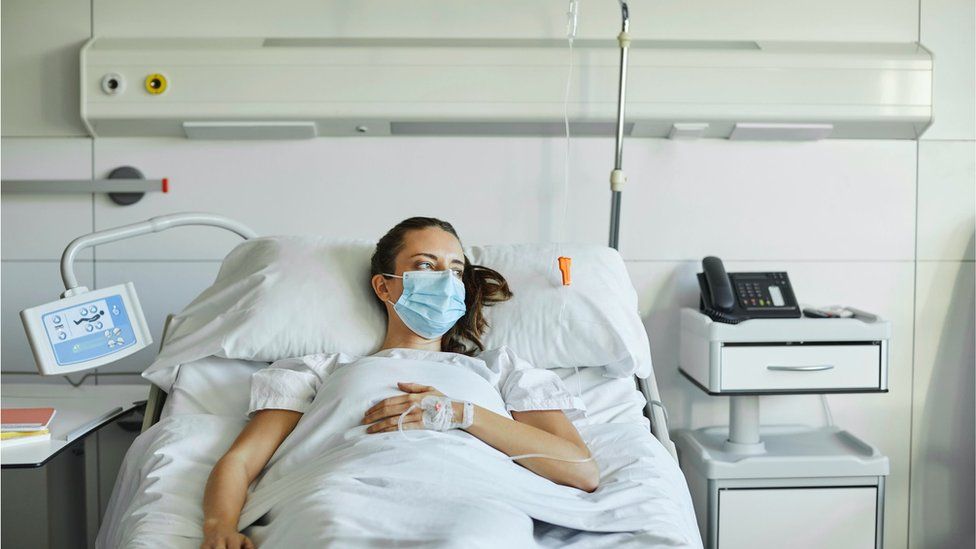ARTICLE AD BOX
 Image source, BBC News
Image source, BBC News
The British Medical Association has rejected Welsh government guidance on discharging people from hospital
Patients discharged from hospital without social care packages could die at home, doctors have warned.
They said Welsh government advice to do this showed a system at breaking point.
The British Medical Association (BMA) said it rejects the guidance to "change the risk threshold" for releasing people from hospital.
The Welsh government said discharging patients could help them get better "by reducing the risk of infection and muscle wastage".
Royal College of General Practitioners Wales chairwoman, Rowena Christmas, said the NHS was "unbelievably stretched".
She believed frail patients could be put at risk.
"A frail, elderly person coming home, who can't really safely get from their bed or their chair to the bathroom without risk of falling over, they're not going to be able to survive at home," Dr Christmas said.
"I completely understand we need more beds, but that feels like a bad move."
The BMA's Dr Iona Collins compared pressure on the NHS to a "slow motion train crash"
The BMA's Dr Iona Collins dubbed the pressures on the NHS a "slow motion train crash".
She said: "You can't pass the responsibility for a failure to deliver services over to the hands of the doctors.
"We have not created this situation. And it is not for us to put our own medical registrations on the line by making decisions we would not make because we don't believe they are safe."
Consultant gastroenterologist at Merthyr Tydfil's Prince Charles Hospital, Peter Neville, believed many doctors would ignore the guidance.
"If you have a bedbound patient who requires nurse care four times a day, and is entirely dependent on carers, there's no possibility of sending them home, because actually they will be in danger if they go home," Mr Neville said.
Doctors, he said, had an obligation to consider the risks.
Gwent's Aneurin Bevan Health Board confirmed it had sent no patients home without care plans since the new since advice was issued.
Image source, Dr Peter Neville
Image caption,Consultant Dr Peter Neville believed doctors would ignore the advice
Torfaen council's social care member David Daniels told the Local Democracy Reporting Service on Thursday there were 253 patients in its beds well enough to leave but unable to do so.
He said: "The concern is people may be discharged into the community and we won't know about it, and we can't then provide the care package to safeguard them."
NHS Wales chief executive, Judith Paget, said the decision to issue guidance to discharge without care packages was taken on a "balance of risks".
She acknowledged there were "huge dilemmas", but argued staff told her they needed to discharge more people from hospital to free beds.
"We need to make sure that we use the space we've got for the people who are the highest risk and in need for care, and support the people who are the lowest in risk to leave our hospitals," she said.
First Minister Mark Drakeford has denied people in Wales face an emergency care lottery.
He said because hospitals were full of "low-risk" patients, high-risk patients were "struggling to get through the front door".
Image source, Dr Rowena Christmas
Image caption,Dr Rowena Christmas said the NHS was "unbelievably stretched"
Mr Neville said hospital staff were exhausted and struggling to cope.
Sickness, he said, constantly needed to be covered which put "enormous" pressure on other staff.
"There simply aren't enough doctors," he said.
He dismissed the working environment as "poor".
"You put that all together, and you have quite a toxic mix that increases early retirement, increases decisions to go part-time, which, of course, then compromises the workforce even more," he said.
Mr Neville claimed "lots" had taken time off for exhaustion.
"We have had consultants in tears, junior doctors in tears," he said.
He believed the workforce did not feel the government was listening.
NHS Wales boss, Judith Paget, said guidance to discharge was made on a "balance of risks"
"People in high places are saying things like the NHS is coping," he said.
"You speak to anybody working on the front line in the NHS, and they will tell you something very different."
Dr Christmas is also worried for colleagues' mental health. They were suffering "moral distress" from worrying about patients, she said.
"We've come out of the pandemic now, and actually, things have just got progressively harder.
"And it's just not really a sustainable picture, what we're dealing with at the moment," said Dr Christmas.
"You can't keep seeing 50% more patients than you've got time for."
First Minister Mark Drakeford has denied the public faces an emergency care lottery
The Welsh government said "unprecedented demand" on the NHS had led to them asking health boards to discharge people who do not need treatment so beds could be used by those who do.
It said this could help patients get better "by reducing the risk of infection and muscle wastage".
"Patients will only be discharged from hospital when it is medically appropriate and safe to do so."

 2 years ago
96
2 years ago
96








 English (US) ·
English (US) ·